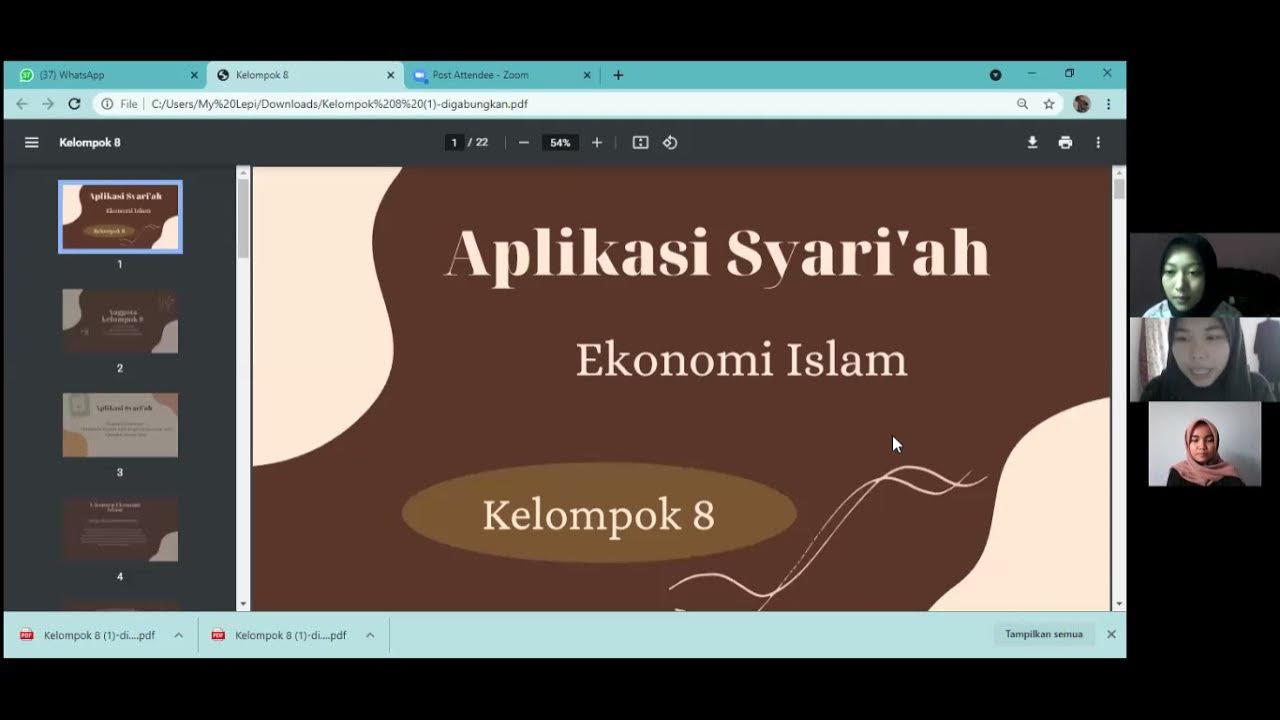Pembentukan Teori Ekonomi Islam; Metodologi, dan Teori
Summary
TLDRThe discussion explores Islamic economics as a distinct discipline, emphasizing the importance of a solid methodology to develop theories rooted in Islamic principles. It addresses the necessity for Islamic economics to draw from its unique epistemological sources, including revelation, reason, and empirical evidence. The speaker critiques the current trend of simply Islamizing conventional economic knowledge, arguing for a deeper foundational approach. The presentation highlights the integration of doctrinal, logical, and factual dimensions in theory validation, ultimately aiming to create theories that align with Islamic objectives while effectively addressing real-world economic phenomena.
Takeaways
- 😀 Islamic economics is a distinct discipline requiring specific criteria and methodologies.
- 📚 Essential components of Islamic economics include subject matter, methodology, theories, and continuous knowledge accumulation.
- 🔍 Current interest exists in revisiting Islamic economic methodology and its implications for conventional economics.
- 💡 There is a need for a methodological framework that can effectively integrate Islamic principles and empirical realities.
- 📖 The sources of knowledge in Islamic economics include revelation (Quran and Hadith), reason, and empirical facts.
- 🔄 Islamization of conventional economic knowledge is pragmatic but should also address foundational knowledge.
- 🧠 Theories in Islamic economics must align with Islamic doctrine, logical reasoning, and real-world applicability.
- 📈 Validating theories in Islamic economics involves establishing unity among doctrinal, logical, and factual dimensions.
- 🔗 The integration of normative and positive dimensions is crucial for comprehensive understanding and explanation of economic phenomena.
- 🌍 The ultimate goal of Islamic economic methodology is to promote societal welfare, in line with the principles of Maqasid al-Shariah.
Q & A
What is the main focus of the discussion in the transcript?
-The discussion focuses on Islamic economic methodology, specifically how Islamic economics serves as a distinct discipline and how theories within this field are developed.
What are the four criteria that define Islamic economics as a discipline?
-Islamic economics must have a subject matter, a methodology for developing knowledge, theoretical frameworks, and a continuous accumulation of knowledge to strengthen its foundation.
Why is there renewed interest in revisiting economic methodologies?
-There is a resurgence of interest due to regular economic crises in mainstream economics, prompting scholars to question the adequacy of current methodologies, including positivism.
What distinguishes the sources of knowledge in Islamic economics from conventional economics?
-Islamic economics derives knowledge from three main sources: revelation (Wahyu), reason (akal), and empirical experience (facts), whereas conventional economics primarily relies on empirical evidence.
What is meant by 'Islamization of knowledge' in the context of Islamic economics?
-Islamization of knowledge refers to the process of aligning conventional economic theories with Islamic principles, determining which theories can be adopted, modified, or rejected based on Islamic teachings.
What are the challenges mentioned regarding the Islamization process in Islamic economics?
-The challenge lies in focusing on the body of knowledge rather than its foundational principles, which may lead to confusion among students who perceive Islamic economics as similar to conventional economics.
What are the goals of the Islamic economic methodology?
-The goals include creating theories that connect ideals with realities, explain phenomena, and assist in achieving Islamic objectives, particularly those aligned with the concept of Maqasid al-Shariah.
How should theories in Islamic economics be validated?
-Theories should be validated through internal integrity (alignment with doctrine), logical integrity (logical reasoning), and empirical integrity (practical applicability), ensuring they reflect all three dimensions.
What is the significance of integrating doctrinal, logical, and factual dimensions in Islamic economics?
-Integrating these dimensions is crucial for developing comprehensive theories that accurately reflect Islamic principles while being applicable to real-world scenarios.
How does the discussion conclude regarding the relationship between theory and reality in Islamic economics?
-The discussion concludes that if there are discrepancies between theory and reality, it requires re-evaluation of either the theories or the facts, emphasizing the importance of continuous reinterpretation to align with Islamic teachings.
Outlines

Этот раздел доступен только подписчикам платных тарифов. Пожалуйста, перейдите на платный тариф для доступа.
Перейти на платный тарифMindmap

Этот раздел доступен только подписчикам платных тарифов. Пожалуйста, перейдите на платный тариф для доступа.
Перейти на платный тарифKeywords

Этот раздел доступен только подписчикам платных тарифов. Пожалуйста, перейдите на платный тариф для доступа.
Перейти на платный тарифHighlights

Этот раздел доступен только подписчикам платных тарифов. Пожалуйста, перейдите на платный тариф для доступа.
Перейти на платный тарифTranscripts

Этот раздел доступен только подписчикам платных тарифов. Пожалуйста, перейдите на платный тариф для доступа.
Перейти на платный тарифПосмотреть больше похожих видео
5.0 / 5 (0 votes)






